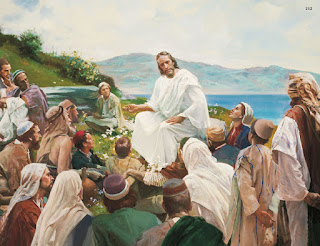Until Heaven and Earth Disappear

Google Images Of all the Lord’s messages that we have recorded for us in Scripture perhaps the most famous is the one given to us in Matthew 5 through 7. Commonly known as the Sermon on the Mount, it covers a variety of subjects—and some pretty heavy ones at that—along with a lot of encouragement. As I read Matthew 5 this morning verses 17 to 20 popped out at me. The chapter begins with the famous “ blesseds ” known as the Beatitudes (3-12). It’s a kind of mini-list of characteristics describing what a follower of Jesus should look like and what those believers should expect from God because of their faithful following of His example. This then leads into a couple of illustrations. People who look like the Beatitudes are the salt of the earth, giving flavour to the world (vs. 13) and they are the light that points others to God (vss. 14-16). These characteristics are what “righteousness” looks like. And, if we are looking for the perfect example of what righteousness is with skin o











